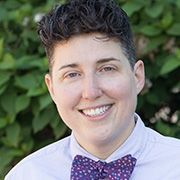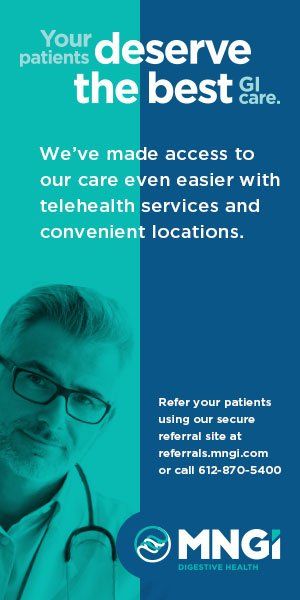Interview
Providing a Supportive Environment for
Children and Their Families
Angela Kade Goepferd, MD, medical director, Gender Health Program, Children’s Minnesota
What does gender-affirming health care mean?
According to the American Academy of Pediatrics (AAP), gender-affirming care is developmentally appropriate care that is oriented toward understanding and appreciating a child’s gender experience. What that means when you’re in the Gender Health clinic at Children’s Minnesota is providing a supportive environment for children and families to ask questions to health care professionals who specialize in the care of transgender and gender-diverse youth. Questions can range from how to address bullying in school, to how parents or caregivers can support their child who may be exploring their gender expression and/or gender identity. Transgender and gender-diverse youth often face significant discrimination in their daily lives in the form of bullying, harassment and sometimes violence, and many LGBTQ youth struggle to identify a single supportive adult they can trust. Transgender and gender diverse youth and their families deserve to have a safe and accepting place to have their questions answered by an expert in gender health, just like a child who has diabetes, asthma or cancer would seek specialized care to optimize their health outcomes. And just like other specialized health care, gender-affirming care is supported by evidence-based research and the expert opinion of every major medical society in the United States.
Please tell us about the work you do at the Children’s Minnesota Gender Health Program.
The Gender Health Program at Children’s Minnesota offers comprehensive care for youth who identify as transgender and gender diverse. Our approach to transgender and gender diverse kids includes understanding and supporting the whole child within the context of their family and community, which includes understanding both their medical as well as their mental health needs. Children’s Minnesota Gender Health Program is an integrated care model, mirroring best practice as defined by the World Professional Association for Transgender Health (WPATH) Standards of Care (SOC) version 8, where each new intake into our program includes both mental health assessment as well as medical assessment. Our multidisciplinary care team works together, along with parents and family, to make care decisions that are tailored and unique for each individual patient. We offer patients gender consultation and developmentally-appropriate treatment, which can include puberty blockers, gender affirming hormones, menstrual suppression and fertility preservation.
What are some of the most challenging patient-related issues you face?
Right now, we are facing two main challenges: 1) Keeping our patients and their families safe and supported in the face of transphobia and 2) correcting rampant misinformation about gender-affirming care and associated treatments being spread in the media. Despite the advances made in recent years for LGBTQ equality and equal rights, transgender and gender diverse youth continue to face regular harassment and discrimination, which jeopardizes both their physical and mental health. Studies show that 80% of transgender kids will face regular harassment in schools, and their suicidality rates are known to be high, up to 40-50%. Working with families to advocate for youth in schools, in sports and in their communities remains one of our biggest challenges. In addition to this, in the last two years, there has been an intentional and deliberate misinformation campaign designed to spread fear and hate about transgender individuals, and in particular, cause fear and panic about transgender and gender diverse kids and the care that they receive. We often have to spend extra time during appointments countering misinformation and very often families are surprised by the inquisitive, deliberate and patient centered approach that we take when providing gender-affirming care. I also know that there are many kids and teens out there who will never make it into our clinic for support because their families have been exposed to myths and misinformation that prevents them from even calling to ask for help.
There are dozens of gender health programs nationwide, how do you collaborate with them?
First, when we were establishing and building our program in 2018-2019, we had the opportunity to learn from some of the best practices that were already established by gender health programs at children’s hospitals across the country, including places like Lurie Children’s in Chicago, Seattle Children’s and Cincinnati Children’s. Many of us are connected via professional list-serves to exchange and share best practice information and we share our research and care outcomes at professional conferences, including the WPATH international conference and the national AAP conference. With the recent targeting of pediatric gender health programs and clinicians with harassment and threats, we have also formed close coalitions with each other to make sure we are doing all we can to keep our patients and families safe, as well as protect our clinic staff and each other.
What are some of the misconceptions about the work you do?
First and foremost, many folks assume that being seen in a gender health clinic equates to receiving gender-affirming medical intervention or treatment that results in permanent changes. When in fact, many of our patients are not receiving any medical treatment, and use our program to access resources, support and information. We also commonly are able to offer reversible medical interventions, such as menstrual suppression and/or puberty suppression and several non-medication-based gender affirming interventions, including voice therapy, gender-affirming shapewear and mental health support. One of the biggest misconceptions about what we do at the Gender Health clinic is that we perform gender-affirming surgeries. In our program at Children’s Minnesota, we do not perform surgery, and for minors to access gender-affirming surgeries, typically chest reconstruction, is still very rare in general. There are also critics, particularly in the media and social media, who think gender-affirming care is not necessary for children who identify as transgender and gender-diverse and can wait until they reach adulthood. However, this “wait and see” approach results in worse mental health outcomes, and we know that taking a gender-affirming approach to care can be life-saving for these kids. A research brief from The Trevor Project found gender-affirming health care can decrease a child’s behavior and emotional issues, and has positive effects on body image and overall wellbeing while reducing thoughts of suicide.
A gender-affirming approach to care can be life saving for these kids..
Recently Mayor Jacob Frey signed an Executive Order designating Minneapolis as a safe haven for gender affirming care. What can you tell us about this?
Executive Order 2022-04 signed by Mayor Jacob Frey establishes the city of Minneapolis as a safe haven for gender-affirming healthcare. The order prohibits all City departments and City staff from taking any enforcement action against health care providers or individuals exercising their right to gender-affirming health care in Minneapolis. It also affirms the rights of minors living apart from their parents to make their own medical decision regarding gender-affirming care, in accordance with Minnesota law. Children’s Minnesota was one of the organizations the mayor’s team consulted with when drafting the order. I was honored to be invited to speak at the signing ceremony and to stand among other local advocates who work tirelessly to advance the rights of transgender youth and adults. This executive order sends a strong message to transgender and gender-diverse families in Minneapolis, that they matter and they belong and they deserve access to high-quality gender-affirming care. Also, Minneapolis was not the only local government to take action on gender-affirming care. Hennepin County recently announced it has invested in services that expand accessible, reproductive and gender-affirming health care for all, with an emphasis on addressing health and racial equity disparities.
Legislation has been proposed in several states that would impose criminal penalties on physicians, clinics and individuals seeking care for gender-health related issues. What can you share about this?
There has been a trend among more conservative led states to restrict or even criminalize gender-affirming care. In 2022, the governor of Texas directed the Texas Department of Family and Protective Services and other state agencies to investigate certain gender-affirming services as child abuse. In response, families of transgender children in Texas rushed to social media, pleading for help and support and, in some cases, attempted to move their families out of Texas. Pediatricians and other clinicians across Texas began to reach out to their colleagues across the country, asking for help in caring for their patients. For these reasons, Marc Gorelick, MD, president and CEO of Children’s Minnesota, and myself sent a letter to the Texas governor to formalize our opposition to the directive. Texas is only one example. Several states in recent years have passed anti-LGBTQ policies. The harm caused by these policies goes beyond what’s written in the legislation. Research shows that transgender youth living in states where legislation is introduced that seeks to ban them from competing in sports, accessing health care or public facilities, causes increased stigmatization and contributes to increased rates of depression, anxiety and suicidality. Therefore, protecting access to inclusive and gender-affirming care can literally be lifesaving for transgender and gender diverse kids.
Related to this topic, clinics nationwide have received threats around providing this care. What can you share about this?
Well, we certainly don’t go into pediatrics expecting to be harassed and threatened for the care that we provide to kids. Unfortunately, however, patients, families and clinicians at children’s hospitals are the focus of a fear and misinformation campaign. According to the Human Rights Campaign Foundation, anti-equality, online extremists are leading a coordinated campaign of hate against hospitals and providers. The people leading the campaign are spreading misinformation and falsehoods about gender-affirming care to spur threats to children’s hospitals, care providers and other staff. Boston Children’s Hospital, Children’s Hospital of Pittsburgh, University of Wisconsin and other hospitals around the country have experienced threats, harassment — even a bomb scare — for providing health care to children and teenagers in their gender health Programs. The Gender Health Program at Children’s Minnesota has also faced harassment on social media. In addition, I’ve received harassing and threatening messages on my social media pages. This is not strictly an LGBTQ issue; it’s an issue for everyone who needs safe and secure access to care at a children’s hospital. Families and children should be provided the care they deserve without the fear of being attacked. The care that takes place between a medical provider and patient families is sacred and should be protected at all costs.
As with all elements of health care delivery there are cultural and equity concerns around gender health. What are some examples?
Identifying as LGBTQ is only one piece of a child’s identity. It intersects with other aspects – race, culture, ability – to make up their entire identity. Sadly, we live in a society where if you’re not white, straight and male – you are at increased risk for harassment and discrimination. For LGBTQ youth who are Black, Indigenous, Latinx or any other race or ethnicity, that harassment can be compounded. For example, the “Erasure and Resilience: The Experiences of LGBTQ Students of Color” report found that 40% of Black LGBTQ students experience both anti-LGBTQ and racist harassment at school. As health care providers, we need to acknowledge our patient’s entire identity and take that into account when we are asking them questions and offer the appropriate support. According to a 2020 report from The Trevor Project, 44% of Black LGBTQ youth seriously considered suicide in the previous 12 months, including 59% of Black transgender and nonbinary youth. That same report found that 49% of Black LGBTQ youth sought out psychological or emotional counseling from a mental health professional in the past 12 months, but were not able to get it. The research found that Black youth who had access to one LGBTQ-affirming space attempted suicide at 50% lower rates compared to Black LGBTQ youth without access. What these numbers tell us is that while ensuring access to gender-affirming care is important for all kids, it can be particularly life-saving for Black, Indigenous, Latinx and other communities of color.
What advice do you have for physicians treating patients with gender-identity related issues?
In so many ways, we have made significant progress when it comes to the health and wellness of LGBTQ youth. We have expanded our language as a society to include more options for sexual and gender identities. More pediatricians are comfortable providing primary care to LGBTQ youth, particularly sexually diverse youth, compared to 10 years ago, even if some still struggle to understand how to best support gender-diverse youth. My advice is to listen to your patients and community and respond to the care that they need. Listen to the experts on your staff and in your community about what inclusive and equitable care looks like. Remember that supporting all kids and families, means supporting and celebrating LGBTQ kids and their families. On the individual patient level, take the time to ask each patient’s name and pronouns and challenge yourself to “get it right”. Remember that just like all kids and teenagers, transgender and gender-diverse youth are on a journey to understand their identities and figure out where they fit. Give them time, messages of unconditional love and support, and make sure they can access the resources they need along the way. On a system level, strong support of hospital leadership, up to the level of the CEO, for diversity, equity and inclusion, will lend itself to developing innovative programs to address health inequities, such as our Gender Health program. We know that with the right support and access to gender-affirming care, transgender and gender diverse kids can grow up to be happy, healthy, safe and strong. And that’s what we want for all our patients and families; we want to help them thrive.
Angela Kade Goepferd (they/she), MD, is the chief education officer and medical director of the Gender Health Program at Children’s Minnesota. In addition, they currently serve on the Board of Directors for Rainbow Health, an LGBTQ health and HIV advocacy organization.
MORE STORIES IN THIS ISSUE
cover story one
Trouble Ahead: Medicaid disenrollment looms
By Matthew L. Anderson, JD
cover story two
Health Care Prebunking: Can people be immunized against disinformation?















